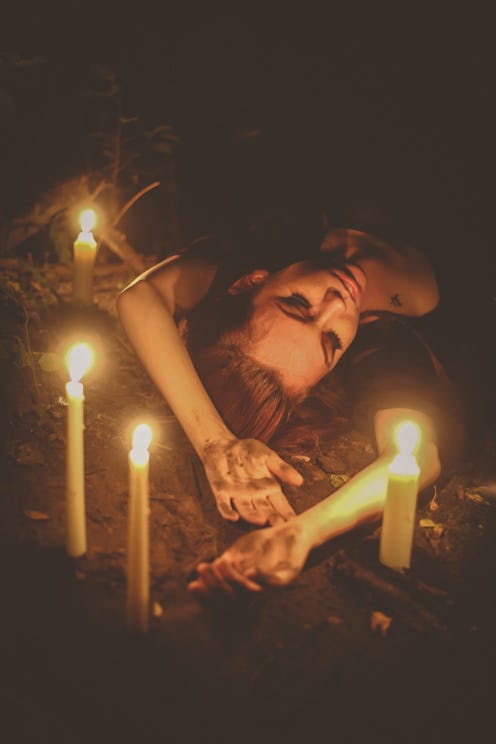Life
This Is The Surprisingly Sexist History Of Friday The 13th
It's not a secret that Friday the 13th has a terrible rap. In Western pop culture, the 13th is a day that, for many people, is ripe for incidences of awful luck. But if you're wondering exactly how Friday the 13th became known as unlucky, well, you can blame the patriarchy for that one.
Friday the 13th as we know it now has a divisive nature. It tends to bring out either the superstitious or skeptical nature in people, which means plenty of folks are either in the "today is ridiculous" faction or in the "I'm probably going to get murdered" camp. Whether you're superstitious or a skeptic, though, it's not likely you know the original meaning of Friday the 13th. According to intuitive Tanaaz Chubb, the day was originally one that was "a very powerful day for feminine energy and creativity." And Chubb is backed up by futurist and holistic intuitive Gina Spriggs, who in an interview with Broadly, discussed the fact that Friday the 13th's unluckiness was assigned to it by patriarchal religions.
It's true — Christianity is the force that turned Friday the 13th from a day of power for feminine folks into a day of fear. Gary Waite, a professor of early modern history at the University of New Brunswick, told CBC News that Christians in the Middle Ages had negative associations with every Friday because they believed Jesus died on a Friday.
Spriggs said, too, that Friday is suspected to be the day that, in Genesis, Eve offered "forbidden fruit" to Adam, and the day the two of them were subsequently kicked out of the Garden of Eden. Waite and Spriggs both offer up an explanation for the supposed unluckiness of the number 13: "[It] stems from the Last Supper — you know, the painting of Jesus eating with the 12 Apostles," Spriggs told Broadly. "Well, the painting got its name because Jesus Christ died shortly after."
"Numbers way, way back had very powerful significance," Waite told CBC. "The number 12 is a very significant number in the Christian faith, so if you add one, that takes away that very positive meaning."
But Friday the 13th had a positive meaning all its own before Christianity.
On her website Forever Conscious, Chubb said that pre-patriarchal religions, Friday the 13th was considered a day of the Goddess. "It was considered a day to worship the Divine Feminine that lives in us all and to honor the cycles of creation and death and rebirth," she added.
Not only were Fridays positive, but the number 13 was as well, Spriggs told Broadly. "Thirteen is a female number, represent[ing] the average number of a woman's cycle in a year," she said. "It is also the number, too, of annual cycles of the moon — viewed by earth-based religions as 'female.'"
And to chalk another one up on the "patriarchy sucks" list, periods weren't considered taboo or shameful, either. Unlike many patriarchal religions, religions who revered feminine energy thought periods caused women to "embody divine and magical powers," said Chubb. "She was regarded by all for her wisdom and ability to offer intuitive and psychic messages."
Despite all this, it was patriarchal religion's superstitions that eventually lodged in Western folks' brains. Waite told CBC that "the fear of Friday the 13th is a modern creation that has made its way into the 21st century," and has been reinforced by coincidental occurrences — Waite cites Apollo 13's oxygen tank explosion as one — and films like Friday the 13th.
Even knowing all this, it can be tough to shake off the negative associations embraced by many people. And considering Waite asserted that bad luck on Friday the 13th can become a self-fulfilling prophecy, you may be wondering how to turn the day into something more positive.
Consider going back to its roots. Don't worry about bad luck; instead, get in tune with yourself and with nature, and celebrate femininity no matter what gender you are. And above all, remember that by embracing the 13th, you can erode just a little bit more of the patriarchy.
Check out the entire 'What's Up, Boo?' series and other videos on Facebook and the Bustle app across Apple TV, Roku, and Amazon Fire TV.
